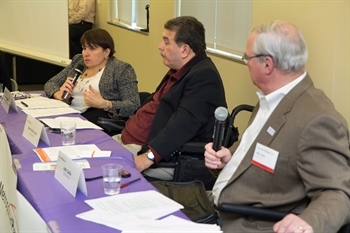
Metropolitan Planning Council
Marca Bristo of Access Living addresses the crowd at our roundtable on Oct. 27.
Earlier this year, The Chicago Community Trust invited the Metropolitan Planning Council (MPC) to host an event to commemorate the 25th anniversary of the Americans with Disabilities Act (ADA). So, we decided to host a lunchtime panel discussion with local leaders from the disability community to help raise awareness about the accessibility issues of public transit and public spaces.
It was going to be great—until we realized that the main entrance to our building, a national historic landmark, is not ADA accessible. So what did we do next? We panicked for a second, and then arranged to move the event to Access Living, the country’s first universally designed corporate building. This episode was a great reminder of the built environmental barriers that so many Chicagoans face.
On Tuesday, Oct. 27, MPC hosted a roundtable discussion entitled “When Public Spaces Fail: Universal Design as Social Justice” to celebrate the progress and discuss the remaining challenges of public spaces and transportation since the passage of the Americans with Disabilities Act 25 years ago. This event featured René Luna, community activist from Access Living, Commissioner Karen Tamley from The Mayor’s Office for People with Disabilities and Jack Catlin, principal architect at LCM Architects.

Panelists Karen Tamley, René David Luna and Jack Catlin
Commissioner Tamley, who gets around in a wheel chair, talked about her high school days when public buses didn’t have wheel chair lifts, meaning she got left behind when her friends went to the mall. Today, all buses and 69 percent of elevated train stations are ADA accessible.
But while the city’s transportation is trending toward accessibility, it is a slow climb that is hampered by the city’s aging architecture and infrastructure that can make ADA accessibility updates costly and complex. MPC’s office space is a prime example of the accessibility limitations posed by our aging built environment: Our doorways don’t meet the minimum standard width to allow wheelchairs to enter with ease. While the city has made great strides in the past 25 years, there is still room for improvement in making our city more accessible for the 2.7 million Chicagoans who reported having a disability in the 2010 census.
Jack Catlin talked about the virtues of universal design—the design of objects and spaces for use by all people in the same way, without any need for specialization. He pointed to Millennium Park as a great example, a nationally recognized public space in Chicago’s downtown that is fully accessible to everyone without calling special attention to that fact. The people who suffer most in the absence of universal design are not only people with disabilities, but children and elderly people, a group that has a lot in common with the disabled community when it comes to community needs. MPC recognizes the intersection between the disabled and aging populations here in our region and will keep that in mind as we plan for the unprecedented growth of our aging population in the Chicago region.

It was a packed crowd at Access Living for our panel celebrating the 25th anniversary of the Americans with Disabilities Act.
An audience member said the Magnificent Mile, one of the city’s biggest tourist attractions and home to many high end retailers, “is not so magnificent” because the curb cuts pose dangers to people like her who are in wheel chairs. In response, Commissioner Tamley encouraged the audience to continue to contact her office with complaints, since they help her department respond to the needs and challenges of the city’s disabled community.
When moderator René Luna asked the speakers about the biggest challenges to making our public spaces and transportation more inclusive, our speakers said it was keeping up with the planning community. Catlin reminded the audience that when the disabled community is involved in planning efforts early on, rather than after the fact or as a result of a lawsuit, accessibility components don’t have to be complex or pricey. Catlin is currently part of an effort to update Chicago’s building code to marry the ADA and fair housing codes and create one set of standards that will make new construction highly accessible in the City of Chicago. He says that accessibility must be governed by ordinances; incentives are not enough.
If disability advocates are disconnected from the urban planning discussions that drive our city then that means that, at best, issues of access become an afterthought. Disability advocates need to be part of the discussion to ensure that everyone can enjoy our city’s public amenities. For example, the diagonal intersection crosswalks like the one at Jackson and State, bike lanes and bus rapid transit will affect people with disabilities and represent opportunities to engage that community for their advice. Marca Bristo, executive director of Access Living, rounded out the audience comments by reminding us that if we think of people with disabilities as marginal, then we will develop marginal policy solutions. MPC was honored to commemorate the 25th anniversary of the ADA and we look forward to engaging our region’s disability community to ensure that our work benefits all.